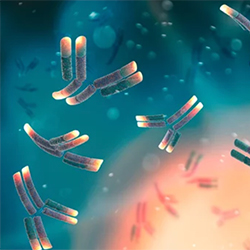Originally published by our sister publication Infectious Disease Special Edition
The National Comprehensive Cancer Network (NCCN) practice guidelines recommended the use of available monoclonal antibodies (mAbs) for pre-exposure prophylaxis of COVID-19.

The NCCN Clinical Practice Guidelines in Oncology (NCCN Guidelines) for the Prevention and Treatment of Cancer-Related Infections advise clinicians to refer to guidance from the Infectious Diseases Society of America, CDC or FDA for available mAb options. This recommendation reflects the growing alignment among key organizations reinforcing the role of mAbs in protecting immunocompromised patients from COVID-19.
New research, which reflects why prevention of SARS-CoV-2 is important for people with cancer, supports the new recommendation (JAMA Oncol 2025 Jul 17. doi:10.1001/jamaoncol.2025.2010). The National Cancer Institute COVID-19 in Cancer Patients Study (NCCAPS) provided insights into the long-term impact of SARS-CoV-2 infection on people with cancer.
Over a two-year period, the NCCAPS study followed 1,572 eligible adult patients with cancer who also had COVID-19. About 80% had solid tumors and 61% were undergoing active or had received recent cancer treatment. The data revealed a high risk for severe disease as evidenced by the rate of hospitalization, treatment delays and mortality within 90 days among patients undergoing chemotherapy or those with hematologic malignancies, consistent with previous studies. Of note, of the 290 patients who were initially hospitalized for COVID-19, 31 had a second admission for sequelae of COVID-19 within 30 days of their initial admission. More than 50% of all cancer treatment disruptions in the cohort were attributed directly to COVID-19, especially during the early phase of infection. These disruptions raised concerns about continuity of care and long-term effects on patient outcomes. These data highlight the importance of continued surveillance and prevention strategies in populations at highest risk for COVID-19 complications.
“The inclusion of monoclonal antibodies in the NCCN Guidelines for the Prevention and Treatment of Cancer-Related Infections reflects a growing recognition across the medical community: it’s time to move beyond a one-size fits all approach to COVID-19 prevention, especially for immunocompromised patients,” said Mark Wingertzahn, PhD, the senior vice president of Clinical Development at Invivyd, which manufactures pemivibart (Pemgarda), an mAb approved for COVID-19 prophylaxis. “Monoclonal antibodies represent one of the most transformative breakthroughs in modern medicine, delivering fast, targeted protection by harnessing the immune system’s natural defenses, helping to reduce risk of severe illness and avoid disruptions to cancer treatment. Ultimately, this is about giving healthcare professionals the tools they need to provide high quality comprehensive cancer care.”
The updated NCCN Guidelines are now available on the NCCN website.
{RELATED-HORIZONTAL}